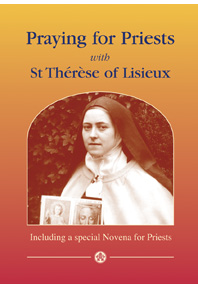Saint Therese of the Child Jesus
of the Holy Face
Entries by Maureen O'Riordan (555)
Blessed Louis Martin, the "incomparable father" of St. Therese of Lisieux: A Father's Day meditation
Blessed Louis Martin, the "incomparable father" of St. Therese of Lisieux: A Father's Day Meditation
At the beatification of Louis and Zélie Martin, Cardinal Saraiva Martins, reading the Pope’s letter, described them as “laypersons, spouses, and parents.” Louis, spouse and parent, knew that the first duty of a good father is to be a good husband. Zelie wrote about him, “I am always very happy with him; he fills my life with tenderness and sweetness. My husband is a very holy man; I wish every woman had a husband like him . . . Our feelings were always in unison, and he was always my support and my consolation.” In the years of their marriage (1858-1877), Louis was a most generous husband and father. Seeing the success of Zélie’s lace business, he gave up the craft of watchmaking for which he had trained for many years, sold his business to his nephew for a modest price, and handled the traveling and business end of the lace-manufacturing business. After Zélie’s death, he left his friends in Alencon to give his daughters the advantage of the influence of their maternal uncle, aunt, and cousins at Lisieux. At a time when the father was usually “master of the house,” he gave his older daughters a free hand in running the household and teaching their little sisters. He spared nothing to develop their talents, procuring art lessons and supplies and giving them every advantage in his power.
Louis Martin was a brave man. As a boy, he belonged to a boys’ military club. Exercising regularly, he grew into a tall, vigorous man. He swam well enough to save a child from drowning, saved trapped persons from fires, and was so courageous on the streets that, if he was out later than usual, his daughters worried that he might be badly injured while trying to separate men who were fighting.
His feminine side was well developed. When he was left a single parent, he became both father and mother to his daughters, who said “our father’s affectionate heart was enriched with a truly maternal love.” Many days he escorted the girls to and from school, listening patiently to the accounts of their days. Every evening he joined them after supper in their little salon, making toys for them, singing to them, telling them stories, reciting poems, and playing games before family prayers.
He had a profound respect for the spiritual lives of his daughters; he not only gave them the greatest freedom to fulfill their vocations but actively supported them. When the vicar-general of the diocese failed to support Therese when she appealed to the Pope for permission to become a Carmelite at fifteen, Louis, meeting him several days later, said forthrightly: “You know very well that you had promised to help me.” When the family was visiting Alencon and Leonie abruptly and without asking permission entered the Poor Clares, he permitted her to remain there and supported her generously. He understood that his daughters belonged to God, Who entrusted him with their care, and joined generously with his wife in their joint task “to bring them up for heaven.” When he became paralyzed and had to accept being cared for in an institution and then by his family, he surrendered himself completely and was deeply touched by their devotion.
Blessed Louis Martin offers the fathers of today a new model of masculinity and fatherhood. Uniting his love for God with his love for his wife and his daughters, he understood the essence of fatherhood: that his role as co-creator of the souls of his children to glorify God did not end with their birth, but continued throughout his life. He was a father, as he often repeated, “all for God’s greater glory.”
St. Therese of Lisieux and the Year of the Priest 2009
 Available in a Kindle Version at Amazon
Available in a Kindle Version at Amazon
Today, on the feast of the Sacred Heart in 2009, Pope Benedict XV inaugurates at Vespers the year of the priest. St. Therese of Lisieux is uniquely suited to accompany us this year as we pray for the renewal of the priesthood. My booklet "Praying for Priests with St. Therese of Lisieux," published by the Catholic Truth Society, tells the story of her apostolate of prayer for priests. She consecrated her life to priests, to be "the apostle of the apostles." Beginning by believing that priests were "purer than crystal," she was quickly disillusioned, but she reacted generously. She embraced the vocation of praying for the spiritual renewal and the mission of priests. And she was drawn to that vocation by understanding the human weakness and sinfulness of priests.
In the Martin family, priests were held in great esteem. Therese's sister Celine said "They seemed like gods to us." Louis Martin had such reverence for priests that, though he entertained his confessor at dinner formally once a year and gave dinners for the clergy when his daughters made their religious professions, he did not otherwise invite priests to his home, thinking the honor too great for him. The clergy respected this reserve so much that, when Pauline spent two years making an alb for a local priest and he came out to Les Buissonnets to thank her, he hesitated at the door and finally turned away without knocking. Therese, as a child, knew priests mostly at the altar and in the confessional. In her early teens, she was moved to pray for sinners like the assasin Pranzini, not for priests.
But just before she entered the Carmelite monastery, Therese made a pilgrimage to Rome sponsored by several French dioceses. Seventy-five of the pilgrims were priests. In "Story of a Soul" Therese writes that their company helped her to understand the vocation of Carmel:
"The scond experience I had relates to priests. Having never lived close to them, I was not able to understand the principal aim of the Reform of Carmel. To pray for sinners attracted me, but to pray for the souls of priests whom I believed to be as pure as crystal seemed puzzling to me!
I understood my vocation in Italy and that's not going too far in search of such useful knowledge.I lived in the company of many saintly priests for a month and I learned that, although their dignity raises them above the angels, they are nevertheless weak and fragile men. If holy priests, whom Jesus in His gospel calls "the salt of the earth," show in their conduct their extreme need for prayers, what is to be said of those who are tepid? Didn't Jesus say too: "If the salt loses its savor, wherewith will it be salted?"
How beautiful is the vocation, O Mother, which has as its aim the preservation of the salt destined for souls! This is Carmel's vocation since the sole purpose of our prayers and sacrifices is to be the apostle of the apostles. We are to pray for them while they are preaching to souls, through their words and especially through their example. I must stop here, for were I to continue I would never come to an end!" (Story of a Soul, tr. John Clarke, O.C.D. Washington, D.C.: ICS Publications, 1988, p. 122. Used with permission).
Therese consecrated herself more and more for priests, urging her novices to pray for them. Throughout the Year of the Priest I will write more about the priests Therese knew; about her apostolate of prayer for priests; about her special interest in the former Carmelite Hyacinthe Loyson, who had left the Church; and about her spiritual sisterhood with seminarian Maurice Belliere and missionary priest Adolphe Roulland. You can read more about Therese's mission to priests at this page. To begin the Year of the Priest I want to say that, if Therese lost her illusions about priests from seeing them eat too well or pray too little on a luxury pilgrimage, she still can accompany us as we face the much greater challenge of continuing to love Jesus and the Church in the face of the clergy sex abuse scandal, especially the most recent revelations of abuse by those representing the Church in Ireland. Therese never lost faith that the priesthood could be as Jesus envisioned it. And she prayed for priests not for their own sake, but for the sake of those God calls them to serve: "Our mission as Carmelites is to form evangelical workers who will save thousands of souls whose mothers we shall be."
For the Year of the Priest, let's pray that we may at once love our priest-brothers in their humanity and call them to fulfill their vocation. Let's take as our motto the words Therese wrote to her sister Celine on New Year's Eve 1889:
"Let us convert souls; this year, we must form many priests who love Jesus and who handle Him with the same tenderness with which Mary handled Him in His cradle."
Update June 27, 2020: I'm delighted that this booklet stayed in print for at least ten years, courtesy of the Catholic Truth Society. Although it's not presently available as a printed booklet, readers all over the world can now order it as an e-book through Amazon. If you do not have a Kindle device, you can read it on other devices. For more information or to purchase, click the booklet cover above. Note that purchases made through this link support this Web site.
St. Therese of Lisieux and the Sacred Heart of Jesus

Therese wrote this poem in 1895, either in June or in October, at the request of her sister, Marie of the Sacred Heart. She does not understand the Heart of Jesus as demanding reparation, but as "burning with tenderness." Jesus is the "only Friend whom I love," "my happiness, my only hope." Unable to see his bright face or hear his voice, she still can rest on the Sacred Heart. In her daring climax, she chooses that Heart for her purgatory.
“To the Sacred Heart of Jesus”
. . . .
To be able to gaze on your glory,
I know we have to pass through fire.
So I, for my purgatory,
Choose your burning love, O heart of my God!
On leaving this life, my exiled soul
Would like to make an act of pure love,
And then, flying away to Heaven, its Homeland,
Enter straightaway into your Heart.
The Poetry of Saint Therese of Lisieux, tr. Donald Kinney, O.C.D. Washington, D.C.: ICS Publications, 1996, pp. 117-120. All rights reserved. Used with permission.
To read this and all Therese's 54 poems, please order a copy of the book "The Poetry of Saint Therese" by clicking on the icon below. This book is the only English translation from the critical and complete edition of Therese's manuscripts of her poetry. Even if you have read some other translation, I urge you to read this one, which includes the original French text and an English introduction and notes rich in interest.
[Purchases through this link support this Web site].
You may also read the text (but not the introduction and notes) of "To the Sacred Heart of Jesus" online thanks to the generosity of the Washington Province of Discalced Carmelites and the Web site of the Archives of the Carmel of Lisieux.
Double librairie en ligne de Saint-Thérèse de Lisieux pour le Canada
Pour servir les nombreux Canadiens qui ont visité "Sainte Thérèse de Lisieux: une porte d'entrée", je suis aujourd'hui l'ouverture d'une double librairie de St. Therese en ligne pour le Canada. Il dispose d'St. Therese propres écrits, de ses biographies, les études de sa spiritualité, des livres sur sa famille, et des albums. S'il vous plait visitez le magasin de Ste. Therese en francais pour Canada. Ou visiter le magasin de Ste. Therese en anglais pour Canada. Merci de soutenir ce site Web par utiliser du magasin.
Bilingual online bookstore about St. Therese for Canadians
To serve the many Canadians who have been visiting "St. Therese of Lisieux: A Gateway," I am today opening an online bookstore for Canada. It features St. Therese's own writings, biographies of her, studies of her spirituality, books about her family, and albums. See English books about St. Therese of Lisieux. Or see French books about St. Therese of Lisieux. Thank you for supporting this Web site by patronizing the store.
